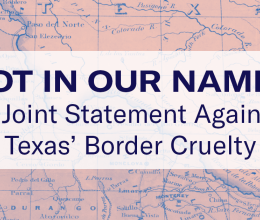
October 26, 2010. Charleston Post & Courier. A new state immigration unit is working largely in secret, avoiding public oversight and refusing to release information about the work it does.
The S.C. Department of Public Safety, which oversees the Immigration Enforcement Unit, will not reveal any details on cases the unit has handled in its first few months of operation.
Public Safety spokeswoman Sherri Iacobelli said in a statement Thursday that "Like any investigative unit, when we give specifics of these cases, we potentially compromise our ability to get to the root of some of these larger, underlying issues."
Bill Rogers, executive director of the S.C. Press Association, said the Public Safety Department cannot use a blanket exemption citing ongoing investigations to withhold all arrest details.
"I would think an arrest record, unless it's sealed by a judge, would be open," Rogers said. "How can there be any public oversight of their work if we can't see their work?"
Iacobelli did not respond to a question Thursday asking whether a judge had sealed the record, or if she knew of any state law that allowed arrest records to be withheld. She said late Thursday that the agency will be happy to answer questions about the unit in a future interview.
Officials said this week that the S.C. Immigration Enforcement Unit's cases are prosecuted by local officials in the jurisdictions where the alleged crimes were committed. In her statement, Iacobelli said the unit is unlike any of the state's other law enforcement divisions.
Since July, when it began working cases, the unit has about 40 arrests or active warrants for arrests, and has a number of ongoing investigations.
"There is no parallel entity anywhere in the country," Iacobelli said. "The unit has only been on the ground, actively investigating cases since July of this year. So there is no point of comparison when you are dealing with the numbers. It is not like DUI arrests or speeding citations."
She said the cases that the unit works are complex, and that one case could stretch on for an extended period of time.
"It may ultimately branch into other arrests and further investigations," Iacobelli said.
Lexington Republican Sen. Jake Knotts is a former law enforcement officer who introduced the provision in the state's 2011 immigration law that created the statewide immigration unit.
He said he can understand not releasing details if the unit actually has an ongoing investigation.
"But at some point in time, they need to be held accountable, and those details should be opened to the public at the proper time," Knotts said.
The Post and Courier filed an S.C. Freedom of Information Act request Thursday with DPS seeking immigration unit records.
The unit is not operating as originally envisioned. It does not have the authority to check a person's residency status, because the so-called "show me your papers" section of the state's immigration law was blocked by a federal judge last year.
The judge has said he needs to reconsider the ruling in light of a U.S. Supreme Court ruling upholding a similar section of Arizona's immigration law.
U.S. District Judge Richard Gergel is expected to again address the S.C. law in a hearing next month.
Lt. Eddie Johnson, the immigration unit's commander, said the unit is focused on stopping crimes being committed by people here illegally.
He said the unit's investigations can begin three ways -- when it receives a call from U.S. Immigration and Customs Enforcement, a complaint from local law enforcement or a complaint from a citizen.
The unit has to rely on ICE to identify a suspect's residency status.
Iacobelli did not respond Thursday to a request for more information about how the citizen complaint process works.
Gov. Nikki Haley praised the immigration unit in a press conference this week addressing the state of DPS. She said it represents a bold step despite federal resistance to parts of the state immigration law.
"Even when D.C. told us we couldn't do it, they have managed to work with ICE officials to make sure that we are doing it, that we are taking on illegal immigration, that we are making cases and that we are getting some of that activity out that we do not want in South Carolina."
Victoria Middleton, executive director of the ACLU of South Carolina, said the group has reservations about the unit in light of the fact that the immigration law is not fully in effect.
"We have concerns about the unit operating without clear authority and appropriate training for its personnel, as the law in its entirety is not in force," she said.
Tammy Besherse, a staff attorney with the Appleseed Legal Justice Center, who works on immigration cases, acknowledged that little is known about the immigration unit's operations at this point.
She said it appears as though the state is figuring out the unit's role on the fly. "We'll be monitoring it and seeing what they're doing and what any impact may be," Besherse said.
by Stephen Largen
